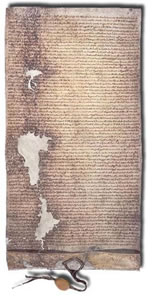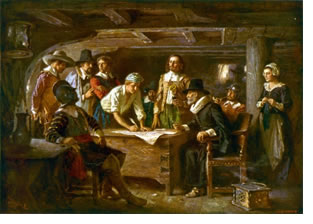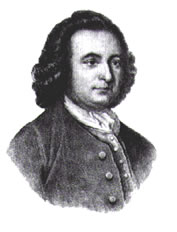Colonial Influence
You have learned that as citizens of a great constitutional democracy like the United States, we have freedoms and rights so many other people around the world do not enjoy. Our government was not simply invented by the Founding Fathers when they signed the Declaration of Independence, or when they met at the Constitutional Convention, but rather it was the product of many years of evolving thinking and experience. In this lesson, you will explore the historical and philosophical origins of the American system of government.
Early English Documents

The image is a photo of the Magna Carta, which is clearly old, tattered, and torn.
The Founding Fathers drew knowledge from their English background and their experiences in democratic government. In the Magna Carta (1215), English barons forced King John to sign a charter guaranteeing certain civil and political freedoms that eventually protected the rights of all Englishmen.
Petition of Right (1628) is an English document, signed by Charles I, which limited the powers of the king or queen concerning liberties of his or her subjects. In other words, it gave "commoners" more of a voice in government.
English Bill of Right, or Declaration of Rights, (1689) guaranteed free elections and the right to a fair and speedy trial and prohibited cruel and unusual punishment. In addition, it prohibited the king from suspending or passing laws and from raising taxes without Parliament's consent.
In summary, it was the English political system that actually set the stage for the revolt of England's colonies in America. Read the section titled "Important English Documents" in "Foundations of Government" to learn about English influences on our government.
Colonial Governments
Colonists looked to early English documents as the foundation of their beliefs concerning the balance between the rights of citizens and the need for government and social order. Plymouth, the second permanent English settlement, was settled in the Massachusetts area in 1620 by settlers known as Pilgrims. The Mayflower Compact was the governing document of the colony set up by the Pilgrims who came over on the Mayflower.

Pilgrims gather on-board their ship, the Mayflower, to sign the Mayflower Compact.
Mayflower Compact
The Mayflower Compact was drawn up by William Bradford, governor of the Plymouth colony. It reflected the Pilgrims' intentions to decide for themselves how they would be governed. Settlers agreed to obey all of their government's laws. The Mayflower Compact first established the belief in "self-government" in North America. It would become one of the founding principles of the United States.
Watch The Pilgrims: Mayflower Compact to learn more about the plan for self-government. PBS login information.
Virginia Declaration of Rights

The image is one of George Mason who drafted the Virginia Declaration of Rights.
The Virginia Declaration of Rights, drafted by George Mason, was adopted in June 1776 by the Virginia Convention at Williamsburg. It is considered the first modern constitutional protection of individual rights for citizens of North America. Mason based his writing on the English Bill of Rights and the ideas of John Locke. The Virginia Declaration of Rights influenced a number of later documents, including the Declaration of Independence and the Bill of Rights.